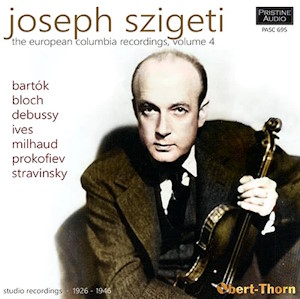
Joseph Szigeti (violin)
The European Columbia Recordings Volume 4
rec. 1926-46, London, New York and Paris
Pristine Audio PASC695 [2 CD: 124]
This is the fourth and final volume in Pristine Audio’s twofer series devoted to Szigeti’s European Columbia recordings and brings things to a triumphant close by presenting two major concertos – Prokofiev’s First with Beecham and Bloch’s with Munch – alongside a raft of smaller pieces. Many of these are very well-known and have appeared before in various guises, whether on LP or CD – in which respect many of the smaller works appeared on Biddulph – but these up-to-date transfers by Mark Obert-Thorn represent the ‘Best in Show’ for our time.
Szigeti was never the most glamorous tonalist but pre-war he retained a consistent balance between affecting phrasing and expressive nobility. When he needed to, as in the excerpts from Warlock’s Capriol Suite, which he arranged, there was a gritty, gutty quality to his playing that brought swathes of liveliness in its wake, as well as stately eloquence. One of the things that this series has done is to move backwards and forwards chronologically so that a performance from the mid-30s, say, is followed by an early electric, something that happens when the Warlock is followed by Debussy’s Menuet in the Dushkin arrangement, a Columbia from 1927. The distantly balanced piano of Kurt Ruhrseitz is encountered, thence we forward immediately to Ravel’s Pièce en forme de habanera, a lovely recording from 1936. This can cause a kind of aural dislocation that would have been avoided had things been structured chronologically but Pristine’s brief is more to group things together by composer; one takes it or leaves it.
Szigeti played Milhaud with considerable wit and was a proselytizer generally for new music. His Tijuca, for example, is saucily knowing. Interesting to consider that Milhaud and Warlock were contemporaries, born barely a month apart. Short of Kochanski himself, it’s almost perfect casting to hear Szigeti in Szymanowski and it’s instructive to hear Szigeti’s highly effective and violinistic Scriabin arrangement. It’s salutary, too, to hear the Prokofiev, a gramophone classic (as they used to say) and a constant rebuke to the violinist’s older self in ever agreeing to remake it, or indeed anything, for Mercury (review). I’m amazed to read critics, who should know better, writing admiringly of these disastrous sessions.
The second CD of this twofer contains the Hungarian Folk Tunes and Romanian Folk Dances, both with Bartók as pianist, than which there could hardly be a greater imprimatur, the former in Szigeti’s arrangement, the latter in the familiar Székely. These famous recordings have been especially well transferred. Bartók’s Portrait No.1 is a post-war recording with the fledgling Philharmonia directed by Constant Lambert and it’s proved a little more obscure in the reissue stakes. Ives’s Violin Sonata No.4 is from a New Music Quarterly session from 1942 – it has some ‘dusty’ sounding surfaces – and it’s best not to mention that abject Mercury remake in 1959 with the admirable Roy Bogas. Bloch’s concerto has appeared plentifully over the years so if – for example – you are still harbouring a two-channel Turnabout LP from 1974, now’s the time to ditch it, given the excellence of this transfer.
This series has been admirably organised, if you acknowledge the non-chronological sequencing, and very finely transferred.
Jonathan Woolf
Availability: Pristine Classical
Contents
CD 1
Peter Warlock (1894-1930)
“Capriol” Suite; excerpts arr. Szigeti; 1. Basse-Danse: Allegro moderato 2. Pavane: Allegretto, ma un poco lento 3. Mattachins: Allegro con brio
Claude Debussy (1862-1918)
Menuet (No. 3 from Petite suite, L 65) arr. Dushkin
Maurice Ravel (1875-1937)
Pièce en forme de habanera arr. Leduc
Darius Milhaud (1892-1974)
Le printemps, Op. 18
Corcavado (No. 7 from Suadades do Brasil, Op. 67) arr. Lévy
Tijuca (No. 8 from Suadades do Brasil, Op. 67) arr. Lévy
Sigurd Lie (1871-1904)
Sne (Snow) arr. Szigeti
Karol Szymanowski (1882-1937)
Le fontaine d’Arthéuse (No. 1 from Mythes, Op. 30)
Alexander Scriabin (1872-1915)
Etude in D flat major, Op. 8, No. 10 (“Etude in Thirds”) arr. Szigeti
Igor Stravinsky (1882-1971)
Pastorale arr. Stravinsky/Dushkin
Danse Russe from Petrushka arr. Dushkin
Sergei Prokofiev (1891-1953)
Gavotte from the “Classical” Symphony, Op. 25 arr. Grunes
Violin Concerto No. 1 in D major, Op. 19
Nikita Magaloff (piano, tracks 1 – 3, 5, 9 – 14)
Kurt Ruhrseitz (piano, tracks 4, 6 – 8)
London Philharmonic Orchestra/Sir Thomas Beecham (tracks 15 – 17)
CD 2
Béla Bartok (1881-1945)
Hungarian Folk Tunes (after For Children) arr. Szigeti
Romanian Folk Dances, Sz.56 (BB 68) arr. Székely
Portrait No. 1 – Egy idealis (One Ideal), Op. 5, Sz.37
Charles Ives (1874-1954)
Violin Sonata No. 4, “Children’s Day at the Camp Meeting”
Ernest Bloch (1880-1959)
Nigun (Improvisation) (No. 2 from Baal Shem, B.47)
Violin Concerto in A minor
Béla Bartók (piano, tracks 1 – 13)
Philharmonia Orchestra/Constant Lambert (track 14)
Andor Foldes (piano, tracks 15 – 17)
Kurt Ruhrseitz (piano, track 18)
Orchestre de la Société des Concerts du Conservatoire/Charles Munch (tracks 19 – 21)


















